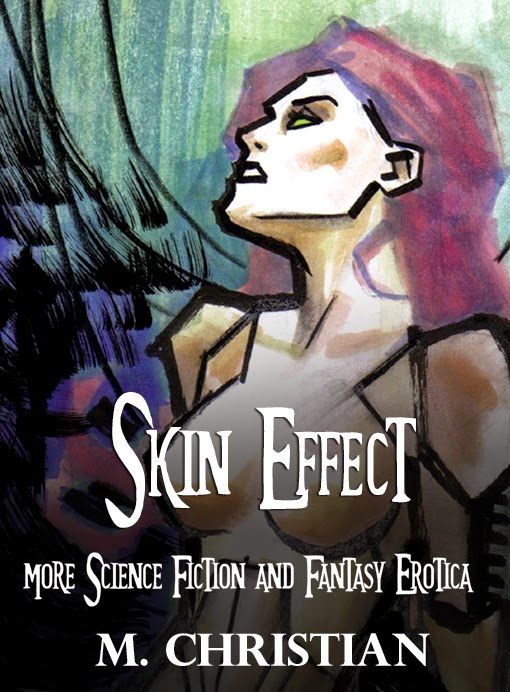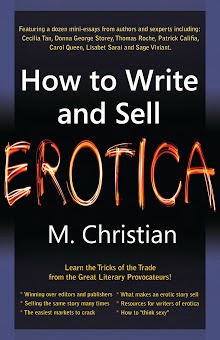M.Christian and Renaissance E Books, through its Sizzler Editions imprint, is pleased and proud to announce the republication of M.Christian's groundbreaking science fiction collection, Bachelor Machine, plus a brand new, never-before seen, follow-up collection: Skin Effect!
M.Christian rocked the world of both science fiction and erotica with Bachelor Machine – Cynthia Ward at Locus Online calling it "smart, taboo-breaking SF" and – and now his groundbreaking book is back in a brand new edition!
Not only that, but M.Christian will further amaze as well as arouse with a follow up collection of imaginative and stimulating stories: Skin Effect!
In Skin Effect and Bachelor Machine are tales that push the envelopes of both science fiction as well as erotica in innovative and stimulating ways: stories voyaging to the near as well as the far future, exploring the ultimate limits of sex and arousal.
In her introduction to Bachelor Machine, Cecilia Tan says of M.Christian "There are only two people in the world I envy. One is the late Roger Zelazny, whose talent for an almost jazz improvisational way of writing I could never match. The other is M.Christian, for writing exactly what I’d write if only I could get off my ass. Which is to say, raunchy hallucinatory sexfuture dreams that never fail to arouse me and kick me in the gut at the same time."
In his forward to Skin Effect, the Chicano science fiction legend Ernest Hogan (author of High Aztech and Cortez On Jupiter), says "The stories in Skin Effect are erotic, and original, state-of-the-art science fiction. They take the technological developments of recent years and plug them into the engines of human desire, taking us beyond our present day sexual issues into worlds that deliver in ways I hadn't imagined possible."
In Skin Effect and Bachelor Machine are tales that are riveting as well as arousing, stories of technology and desire, and arousal and innovation ... told in an engaging and evocative style guaranteed to amaze as well as excite.
From down and out hustlers, enhanced sex workers, enigmatic aliens, bleeding edge erotic technologies, and more – Bachelor Machine and Skin Effect are an unique visions of the future, while celebrating humanity's oldest pleasure ... sex!
"M.Christian’s stories squat at the intersection of Primal Urges Avenue and Hi-Tech Parkway like a feral-eyed, half-naked Karen Black leering and stabbing her fractal machete into the tarmac. Truly an author for our post-everything 21st century."
–Paul Di Filippo, The Steampunk Trilogy
"M.Christian speaks with a totally unique and truly fascinating voice. There are a lot of writers out there who'd better protect their markets – M. Christian has arrived!"
–Mike Resnick, Hugo and Nebula Award winning science fiction author
"When I tell you that these stories are hot, I might be giving you an understatement. M.Christian’s erotica comes from the heart ... he has created an entire new genre."
–Amos Lassen
"There is an uncommon variety of material in here [Bachelor Machine], from cyberpunk to space opera, alternative history to dystopia. The science-fictional settings are manifold, as are the sexual positions and inclinations—and, more importantly, the role of the inevitable explicit sex within each story. From the frivolous to the poignant to the socio-politically scathing, there’s something in this book for everyone."
–Johann Carlisle, Future Fire
"M.Christian is a hybrid artist and knockout stylist on the order of Jonathan Lethem. Hard-boiled, sharp-edged, funny and fierce, his tales brim with unbridled imagination and pitch-perfect satire,"
–Jim Gladstone
"M.Christian is a writer who takes you for a long walk down a dark wet street at midnight. You can't get much more edgy and still be legal. His fiction never disappoints."
–Nancy Kilpatrick, The Power of the Blood series and In the Shadow of the Gargoyle
Calling M.Christian versatile is a tremendous understatement. Extensively published in science fiction, fantasy, horror, thrillers, and even non-fiction, it is in erotica that M.Christian has become an acknowledged master, with more than 400 stories in such anthologies as Best American Erotica, Best Gay Erotica, Best Lesbian Erotica, Best Bisexual Erotica, Best Fetish Erotica, and in fact too many anthologies, magazines, and sites to name. In erotica, M.Christian is known and respected not just for his passion on the page but also his staggering imagination and chameleonic ability to successfully and convincingly write for any and all orientations.
But M.Christian has other tricks up his literary sleeve: in addition to writing, he is a prolific and respected anthologist, having edited 25 anthologies to date including the Best S/M Erotica series; Pirate Booty; My Love For All That Is Bizarre: Sherlock Holmes Erotica; The Burning Pen; The Mammoth Book of Future Cops, and The Mammoth Book of Tales of the Road (with Maxim Jakubowksi); Confessions, Garden of Perverse, and Amazons (with Sage Vivant), and many more.
M.Christian's short fiction has been collected into many bestselling books in a wide variety of genres, including the Lambda Award finalist Dirty Words and other queer collections like Filthy Boys, BodyWork, and his best-of-his-best gay erotica book, Stroke the Fire. He also has collections of non-fiction (Welcome to Weirdsville, Pornotopia, and How To Write And Sell Erotica); science fiction, fantasy and horror (Love Without Gun Control); and erotic science fiction including Rude Mechanicals, Technorotica, Better Than The Real Thing, and the acclaimed Bachelor Machine.
As a novelist, M.Christian has shown his monumental versatility with books such as the queer vamp novels Running Dry and The Very Bloody Marys; the erotic romance Brushes; the science fiction erotic novel Painted Doll; and the rather controversial gay horror/thrillers Finger's Breadth and Me2.
M.Christian is also the Publisher of Digital Parchment Services and an Associate Publisher for Renaissance E Books, where he strives to be the publisher he'd want to have as a writer, and to help bring quality books (erotica, noir, science fiction, and more) and authors out into the world.
Bachelor Machine: $2.99
Skin Effect: $2.99











